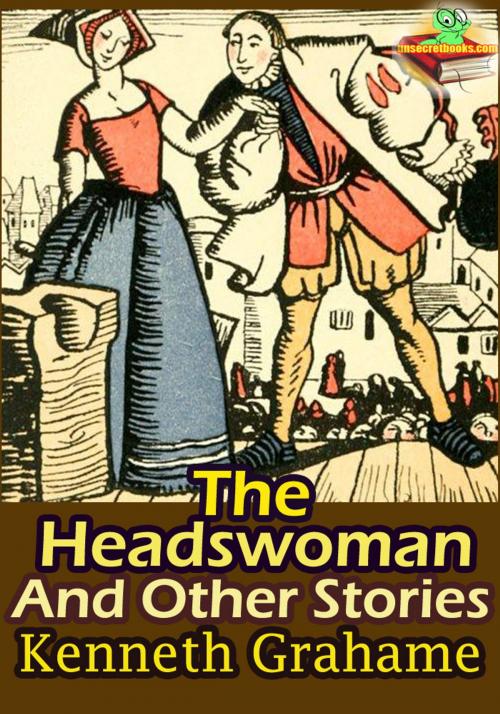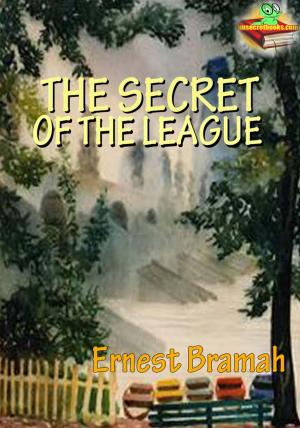The Headswoman : And Other Stories
(Classic Children's Literature With Over 33 Illustrations)
Fiction & Literature, Classics| Author: | Kenneth Grahame | ISBN: | 1230000102185 |
| Publisher: | Unsecretbooks.com | Publication: | January 25, 2013 |
| Imprint: | Language: | English |
| Author: | Kenneth Grahame |
| ISBN: | 1230000102185 |
| Publisher: | Unsecretbooks.com |
| Publication: | January 25, 2013 |
| Imprint: | |
| Language: | English |
The Headswoman And Other Stories is the classic children's literature by Kenneth Grahame, who was a Scottish writer, most famous for The Wind in the Willows (1908), one of the classics of children's literature. He also wrote The Reluctant Dragon; both books were later adapted into Disney films.
This version is contained 3 works:
“The Headswoman”
“Permit me, Mr. Mayor,” said the girl quietly, “first to thank you for what was evidently the outcome of a kindly though misdirected feeling on your part; and then to set you right as to the grounds of my application for the post to which you admit my hereditary claim. As to my cousin, your conjecture as to the feeling between us is greatly exaggerated; and I may further say at once, from my knowledge of his character, that he is little qualified either to adorn or to dignify an important position such as this. A man who has achieved such indifferent success in a minor and less exacting walk of life, is hardly likely to shine in an occupation demanding punctuality, concentration, judgment,—all the qualities, in fine, that go to make a good business man. But this is beside the question. My motive, gentlemen, in demanding what is my due, is a simple and (I trust) an honest one, and I desire that there should be no misunderstanding. It is my wish to be dependent on no one. I am both willing and able to work, and I only ask for what is the common right of humanity,—admission to the labour market. How many poor, toiling women would simply jump at a chance like this which fortune, by the accident of birth, lays open to me! And shall I, from any false deference to that conventional voice which proclaims this thing as ‘nice,’ and that thing as ‘not nice,’ reject a handicraft which promises me both artistic satisfaction and a competence? No, gentlemen; my claim is a small one,—only a fair day’s wage for a fair day’s work. But I can accept nothing less, nor consent to forgo my rights, even for any contingent remainder of possible cousinly favour!”
“The Golden Age”
Looking back to those days of old, ere the gate shut behind me, I can see now that to children with a proper equipment of parents these things would have worn a different aspect. But to those whose nearest were aunts and uncles, a special attitude of mind may be allowed. They treated us, indeed, with kindness enough as to the needs of the flesh, but after that with indifference (an indifference, as I recognise, the result of a certain stupidity), and there with the commonplace conviction that your child is merely animal. At a very early age I remember realising in a quite impersonal and kindly way the existence of that stupidity, and its tremendous influence in the world; while there grew up in me, as in the parallel case of Caliban upon Setebos, a vague sense of a ruling power, wilful and freakish, and prone to the practice of vagaries—"just choosing so:" as, for instance, the giving of authority over us to these hopeless and incapable creatures, when it might far more reasonably have been given to ourselves over them. These elders, our betters by a trick of chance, commanded no respect, but only a certain blend of envy—of their good luck—and pity—for their inability to make use of it. Indeed, it was one of the most hopeless features in their character (when we troubled ourselves to waste a thought on them: which wasn't often) that, having absolute licence to indulge in the pleasures of life, they could get no good of it. They might dabble in the pond all day, hunt the chickens, climb trees in the most uncompromising Sunday clothes; they were free to issue forth and buy gunpowder in the full eye of the sun—free to fire cannons and explode mines on the lawn: yet they never did any one of these things. No irresistible Energy haled them to church o' Sundays; yet they went there regularly of their own accord, though they betrayed no greater delight in the experience than ourselves.
“Pagan Papers”
In these iron days of the dominance of steam, the crowning wrong that is wrought us of furnace and piston-rod lies in their annihilation of the steadfast mystery of the horizon, so that the imagination no longer begins to work at the point where vision ceases. In happier times, three hundred years ago, the seafarers from Bristol City looked out from the prows of their vessels in the grey of the morning, and wot not rightly whether the land they saw might be Jerusalem or Madagascar, or if it were not North and South America. ``And there be certaine flitting islands,'' says one, ``which have been oftentimes seene, and when men approached near them they vanished.'' ``It may be that the gulfs will wash us down,'' said Ulysses (thinking of what Americans call the ``getting-off place''); ``it may be we shall touch the Happy Isles.'' And so on, and so on; each with his special hope or ``wild surmise.'' There was always a chance of touching the Happy Isles. And in that first fair world whose men and manners we knew through story-books, before experience taught us far other, the Prince mounts his horse one fine morning, and rides all day, and sleeps in a forest; and next morning, lo! a new country: and he rides by fields and granges never visited before, through faces strange to him, to where an unknown King steps down to welcome the mysterious stranger. And he marries the Princess, and dwells content for many a year; till one day he thinks ``I will look upon my father's face again, though the leagues be long to my own land.'' And he rides all day, and sleeps in a forest; and next morning he is made welcome at home, where his name has become a dim memory. Which is all as it should be; for, annihilate time and space as you may, a man's stride remains the true standard of distance; an eternal and unalterable scale. The severe horizon, too, repels the thoughts as you gaze to the infinite considerations that lie about, within touch and hail; and the night cometh, when no man can work.
The Headswoman And Other Stories is the classic children's literature by Kenneth Grahame, who was a Scottish writer, most famous for The Wind in the Willows (1908), one of the classics of children's literature. He also wrote The Reluctant Dragon; both books were later adapted into Disney films.
This version is contained 3 works:
“The Headswoman”
“Permit me, Mr. Mayor,” said the girl quietly, “first to thank you for what was evidently the outcome of a kindly though misdirected feeling on your part; and then to set you right as to the grounds of my application for the post to which you admit my hereditary claim. As to my cousin, your conjecture as to the feeling between us is greatly exaggerated; and I may further say at once, from my knowledge of his character, that he is little qualified either to adorn or to dignify an important position such as this. A man who has achieved such indifferent success in a minor and less exacting walk of life, is hardly likely to shine in an occupation demanding punctuality, concentration, judgment,—all the qualities, in fine, that go to make a good business man. But this is beside the question. My motive, gentlemen, in demanding what is my due, is a simple and (I trust) an honest one, and I desire that there should be no misunderstanding. It is my wish to be dependent on no one. I am both willing and able to work, and I only ask for what is the common right of humanity,—admission to the labour market. How many poor, toiling women would simply jump at a chance like this which fortune, by the accident of birth, lays open to me! And shall I, from any false deference to that conventional voice which proclaims this thing as ‘nice,’ and that thing as ‘not nice,’ reject a handicraft which promises me both artistic satisfaction and a competence? No, gentlemen; my claim is a small one,—only a fair day’s wage for a fair day’s work. But I can accept nothing less, nor consent to forgo my rights, even for any contingent remainder of possible cousinly favour!”
“The Golden Age”
Looking back to those days of old, ere the gate shut behind me, I can see now that to children with a proper equipment of parents these things would have worn a different aspect. But to those whose nearest were aunts and uncles, a special attitude of mind may be allowed. They treated us, indeed, with kindness enough as to the needs of the flesh, but after that with indifference (an indifference, as I recognise, the result of a certain stupidity), and there with the commonplace conviction that your child is merely animal. At a very early age I remember realising in a quite impersonal and kindly way the existence of that stupidity, and its tremendous influence in the world; while there grew up in me, as in the parallel case of Caliban upon Setebos, a vague sense of a ruling power, wilful and freakish, and prone to the practice of vagaries—"just choosing so:" as, for instance, the giving of authority over us to these hopeless and incapable creatures, when it might far more reasonably have been given to ourselves over them. These elders, our betters by a trick of chance, commanded no respect, but only a certain blend of envy—of their good luck—and pity—for their inability to make use of it. Indeed, it was one of the most hopeless features in their character (when we troubled ourselves to waste a thought on them: which wasn't often) that, having absolute licence to indulge in the pleasures of life, they could get no good of it. They might dabble in the pond all day, hunt the chickens, climb trees in the most uncompromising Sunday clothes; they were free to issue forth and buy gunpowder in the full eye of the sun—free to fire cannons and explode mines on the lawn: yet they never did any one of these things. No irresistible Energy haled them to church o' Sundays; yet they went there regularly of their own accord, though they betrayed no greater delight in the experience than ourselves.
“Pagan Papers”
In these iron days of the dominance of steam, the crowning wrong that is wrought us of furnace and piston-rod lies in their annihilation of the steadfast mystery of the horizon, so that the imagination no longer begins to work at the point where vision ceases. In happier times, three hundred years ago, the seafarers from Bristol City looked out from the prows of their vessels in the grey of the morning, and wot not rightly whether the land they saw might be Jerusalem or Madagascar, or if it were not North and South America. ``And there be certaine flitting islands,'' says one, ``which have been oftentimes seene, and when men approached near them they vanished.'' ``It may be that the gulfs will wash us down,'' said Ulysses (thinking of what Americans call the ``getting-off place''); ``it may be we shall touch the Happy Isles.'' And so on, and so on; each with his special hope or ``wild surmise.'' There was always a chance of touching the Happy Isles. And in that first fair world whose men and manners we knew through story-books, before experience taught us far other, the Prince mounts his horse one fine morning, and rides all day, and sleeps in a forest; and next morning, lo! a new country: and he rides by fields and granges never visited before, through faces strange to him, to where an unknown King steps down to welcome the mysterious stranger. And he marries the Princess, and dwells content for many a year; till one day he thinks ``I will look upon my father's face again, though the leagues be long to my own land.'' And he rides all day, and sleeps in a forest; and next morning he is made welcome at home, where his name has become a dim memory. Which is all as it should be; for, annihilate time and space as you may, a man's stride remains the true standard of distance; an eternal and unalterable scale. The severe horizon, too, repels the thoughts as you gaze to the infinite considerations that lie about, within touch and hail; and the night cometh, when no man can work.















